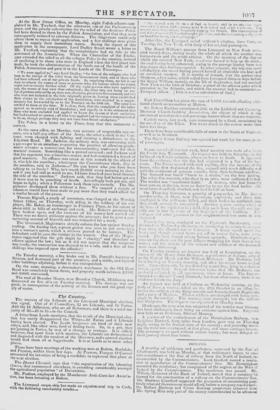A Commission of Lunacy sat on Tuesday, at Gray's Inn
Coffte- house, to inquire into the state of mind of Miss Louisa Ridge, a lady of fortune, whose friends reside near Yarmouth. The patient was haunted with a strange notion that Lord Prudhoe, who also, she said, went by the name of Neville, was desirous of marrying her. Ample evidence was produced to prove her insanity ; and a verdict was given accordingly.
It gives us great pleasure to find that a new institution is about to be opened at the West End, to afford to the houseless poor a supper, bed, breakfast, and medical assistance if required. The Committee have appointed Mr. Charles Corpe, of Margaret Street, Cavendish Square, as their medical officer; and the list of subscribers already includes the chief of the nobility.—Times.
At the Bow Street Office, on Monday, eight Polish officers corn: plained to Mr. Twyford, thut the allowance out of the Parliamentery grant, and the private subscription for the relief of the destitute Pules, bad been denied to them by the Polish Association, and that they were consequently reduced to extreme distress. The Magistrate could only advise them to repeat their application, and a few shillings were given them to supply their immediate wants. Seeing the report of this application in the newspapers, Lord Dudley Stuart wrote a letter to Mr. Twyford, explaining that the complainants had no title to the
assistance of the Association. When the Chancellor of the Exche- quer extended the relief to all the refugee Pules in the country, iestead of confining it to those who were in England when the first grant was made, he took the administration of the funds out of the hands of the Polish Association and gave it to the Lords of the Treasury—
o We were applied to," says Lotd Dudley, "for lists of the refugees who had been in the receipt of the relief from the Government fund, and of those who
had been relieved out of our private funds. In supplying them, we felt it our duty to submit the names of some as persons who for reasons which we stated, ought not to receive further relief. Of the eight persons who have applied to you, the names of four were thus submitted ; the other two not being on any list of persons relieved by t19, were not, of (mum, given in to Government, and two
who were not included in the lists originally given in, having since established their claims to the satisfaction of the Association, were inserted in a supple- mentary list forwarded by us to the Treasury on the 18th ult. The same was notified to them at the time. It is clear, then, that the complaint of the latter against us is entirely void of foundation ; and equally so is the statement that those who were excluded had applied to ktiow the reason of their exclusion, but had received no answer ; all who have applied had the reasons communicated to them, though perhaps they may not have been found satisfactory."
The Pules, in a letter to the Times, deny that this statement is correct.
At the same office, on Monday, two persons of respectable appear- ance, one a half-pay officer of the Army, the other a clerk in the Cus- toms, were charged with fighting and creating a disturbance in the Edgware Road. Mr. Jackson, the military man, was conversing with a pusseeger in an omnibus, respecting the practice of allowing gentle- men's servants a commission for recommendieg tradesmen for their masters' custom. Something like a quarrel occurred ; and Jackson said that his opponent was a breeches-maker, and had committed a breads of good manners. No offence was taken at this remark by the object of it, who left the omnibus ; whereupon the Customhouse clerk, also in the omnibus, said to Jackson—" Do you know who you have been talking to so freely ? Why, he's worth 20,000/. every morning he rises : and if you bad said as much to me, I'd have knocked your head through the side of the omnibus." Jackson said, that they bad better get out if there was to be punching of heads. Accordingly both got out, and began to fight; when a Policeman took them into custody. The Ma- gistrates discharged them without a fine. We suspect a couple of labourers would have been made to pay more than they could afford for a similar breach of the peace.
Thomas Bignell, a youth of seventeen, was charged at the Worship Street Office, on Thursday, with aiding in the rubbery of his em- ployer, Mr. Baker, an ironmonger in Finsbury Place, to the extent of about 6201. in bills of exchange and cash. Mr. Baker's premises had been broken open, and the contents of his money. box carried off. There was no direct evidence against the prisoner; but he geve a pre- varicating account of himself, and was remanded for a week.
The Greenwich Magistrates strictly enforce the law against Sunday trading. On Sunday last, a greengrocer was seen to put something into a woman's apron, which a witness proved to be turnips. The defendant said he gave the turnips to the woman. One of the Magis- trates suggested that the gift might be " charity," and therefore no offence against the law ; but as it did not appear that the recipient was needy, the transaction was decreed to be a sale, and a fine of five shillings was imposed upon the offender !



























 Previous page
Previous page